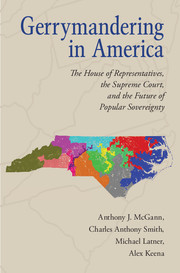 Gerrymandering in America
Gerrymandering in America Book contents
- Frontmatter
- Contents
- 1 The Unnoticed Revolution
- 2 The Jurisprudence of Districting
- 3 Measuring Partisan Bias
- 4 Geographic Explanations for Partisan Bias
- 5 Political Explanations of Partisan Bias
- 6 Constitutional Implications of Vieth: The Revenge of the Anti-Federalists
- 7 Answering Justice Scalia's Challenge to Equality: Does Equal
- 8 Conclusion: Vieth, Majority Rule, and One Person, One Vote
- Bibliography
- Index
2 - The Jurisprudence of Districting
Published online by Cambridge University Press: 05 March 2016
- Frontmatter
- Contents
- 1 The Unnoticed Revolution
- 2 The Jurisprudence of Districting
- 3 Measuring Partisan Bias
- 4 Geographic Explanations for Partisan Bias
- 5 Political Explanations of Partisan Bias
- 6 Constitutional Implications of Vieth: The Revenge of the Anti-Federalists
- 7 Answering Justice Scalia's Challenge to Equality: Does Equal
- 8 Conclusion: Vieth, Majority Rule, and One Person, One Vote
- Bibliography
- Index
Summary
This chapter covers the jurisprudence concerning the drawing of districts for the U.S. House of Representatives. The Supreme Court in Vieth v. Jubelirer (2004) found that the courts could not intervene in districting on the grounds of partisan gerrymandering (that is, these cases are “nonjusticiable”) because no standards exist for deciding them. Four justices wished to declare partisan gerrymandering complaints nonjusticiable on principle, while a fifth concurred that there was no satisfactory existing standard, although one might be found in the future. As we argued in the previous chapter, this is a decision of profound political and constitutional importance.
In this chapter, we analyze the Vieth decision in the context of a history of jurisprudence on districting, going back to the “one person, one vote” cases of the 1960s that followed Baker v. Carr (1962). In contrast to Justice Scalia, who argued in Vieth v. Jubelirer (2004, 290) that the one-person, one-vote standard is irrelevant to partisan gerrymandering cases, we will argue that in terms of both its judicial doctrine and political effects, Vieth v. Jubelirer is the latest round in a constitutional struggle over limits of states’ congressional districting practices going back at least to the 1960s. Indeed, in Chapter 7, we will argue that this dispute can actually be traced all the way back to the Federal Convention of 1787. The significance of the one-person, one-vote cases of the 1960s that followed the Baker decision was that they severely constrained the power of state legislatures to manipulate House elections by drawing the districts (see Issacharoff et al. 2012). This was appropriately described as the “Reapportionment Revolution” (see Cox and Katz 2002; Ansolabehere and Snyder 2008). The districting plans that were overturned in these cases were examples of malapportionment – districts that varied widely in population. During this period, the Court found that vote dilution of any kind – weighting votes differently based on where someone lives – was unacceptable and unconstitutional. Nevertheless, these cases did not entirely resolve the justiciability of gerrymandering. Although the Supreme Court's rulings in Wesberry v. Sanders (1964a) and Reynolds v. Sims (1964b) explicitly forbade malapportionment and vote dilution, they did not explicitly mention gerrymandering. Of course, if the gerrymandering of districts by state legislatures were allowed, banning malapportionment would have little effect.
- Type
- Chapter
- Information
- Gerrymandering in AmericaThe House of Representatives, the Supreme Court, and the Future of Popular Sovereignty, pp. 22 - 55Publisher: Cambridge University PressPrint publication year: 2016


